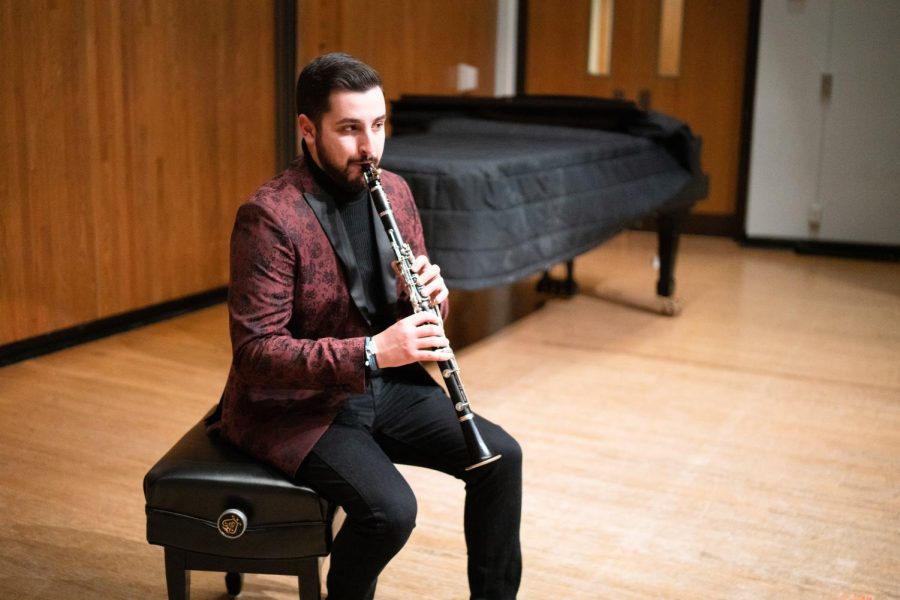Krannert Center debut artist discusses musical journey
Andrew Buckley, graduate student in FAA, practices playing his clarinet inside one of the auditoriums within the University’s School of Music building. Buckley will be debuting his album, “Where We Go Next,” this spring at the Smith Memorial Hall.
Feb 23, 2022
Andrew Buckley, the 2021 Krannert Center Debut Artist and graduate student in FAA, sees a glass wall between the stage and the auditorium.
He describes a typical symphony orchestra concert: Musicians silently walk on and off stage as the audience sits still and claps in the dark.
As a clarinetist for more than 10 years, Buckley has embraced this classical musical tradition. But now, with his upcoming debut professional album “Where We Go Next” premiering with The Goodwin Avenue Trio on April 9 at Smith Memorial Hall, Buckley said he is redefining what a classical concert experience is truly about.
“The question is, what does classical music sound like in the next 10 years?” Buckley said.“This is it.”
According to Buckley, in his early undergraduate career, his chief reason for creating music was to make a living. To become more employable, he joined three instrument studios as a conducting apprentice in the school’s wind ensemble.
Get The Daily Illini in your inbox!
However, Buckley said he realized that he was spreading himself too thin trying to monetize his talents.
“Is that really why I’m a musician — just to make money?” Buckley said. “Part of it, but it’s more so to create outstanding and deep emotional musical performances. And I don’t think you can do that until you narrow down the focus and commit to one thing. For me, that was clarinet.”
“I want to stay away from talent, but it just comes naturally,” Buckley said.
Unfortunately, the pandemic hit before Buckley started to pursue his master’s degree. He said he was sinking into turmoil because of the lack of gig opportunities and the newfound dullness in graduate school.
During this time, he founded The Goodwin Avenue Trio with pianist Chanmi Lee and cellist Briar Schlenker, both graduate students in FAA.
“We have to create something because we’re just gonna go nuts if we don’t,” Buckley said.
The trio made its professional debut in March 2021, with only 40 people sitting 10 feet apart. The concert was also live streamed. Buckley said the scattered audience did not react a lot. He felt like he was talking to a brick wall when he constantly shifted his attention between the auditorium and the live-stream camera.
Despite the difficulties, Buckley said he heard appreciation from people for him bringing them back to concert halls.
“It was weird for them in that aspect, but people didn’t mind,” Buckley said. “They just wanted to be there.”
Buckley’s girlfriend, Becca Frederick, graduate student in FAA, recalled how when the Illinois Wind Symphony presented “Pines of Rome” last semester, she saw people moved to tears by Buckley’s clarinet solo.
Buckley said he knew it was his best performance because he had played the excerpt more than 500 times.
Buckley said that after enough practice, all technical playing points slip away. He said that he concentrates more on expression onstage. He mentioned that sometimes, he even stops focusing on rhythm.
“He’s so passionate about what he has to say through the music,” Frederick said. “You can see it in his face. You can hear it in the sound and his movement. He’s very expressive, very good at getting the audience to feel what he wants them to feel.”
Buckley said he has been reflecting on performer-centered classical concerts.
“The audience members don’t feel like they’re having an experience,” he said. “They’re watching somebody else have an experience. Are we really conveying emotion when we’re doing that?”
Buckley has a solution. He said that he gives oral program notes and asks the audience for feedback during intermissions. He said this communication includes the audience in the music-making process and allows them to see the personality behind the performance instead of a robot moving fingers on a musical instrument.
When Buckley won eight hours of free recording in Krannert Center Debut Artist competition, his first thought was to record his four favorite pieces of classical clarinet. But, he hesitated.
“Those four pieces have been recorded 100 times by performers that are way better than me and way better than I ever will be,” he said. “Is that something where people are actually gonna take notice?”
At that time, Buckley said that he met Professor Bärli Nugent from The Juilliard School in a music entrepreneurship class. Nugent encouraged Buckley to feature new, diverse composers of his age in his album. Buckley said he immediately decided to go for this idea.
According to Frederick, student composers have little chance to get their works presented even by school ensembles. Buckley added that all these composers have are recordings produced on iPhones that are put on websites and often never played again. To Buckley, this is a waste of creative energy.
Buckley said his debut album aims to give voice to the underrepresented young musicians and to engage the audience.
“The music people are going to hear is more representative of the 21st century,” Buckley said. “It’s not Beethoven, Mozart, Haydn. It’s new, it’s weird, it’s experimental — kind of everything that folks in my generation are going through right now.”
To Buckley, the most exciting thing about this album is that the music has never been heard before. He said the Trio is now bringing the creation to life.
“We’re trying to invent the next cool thing,” Buckley said. “The next fancy thing. The next form of our heart.”






